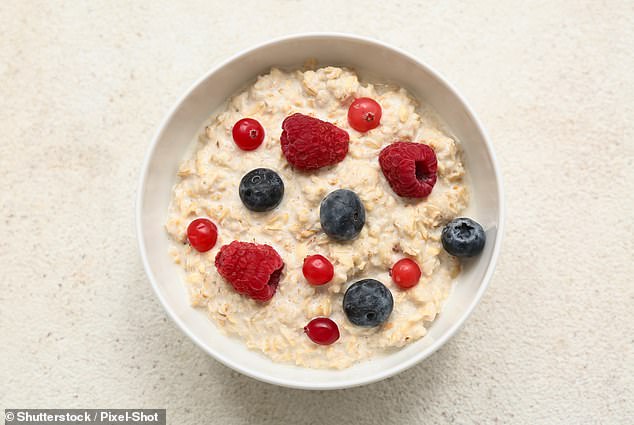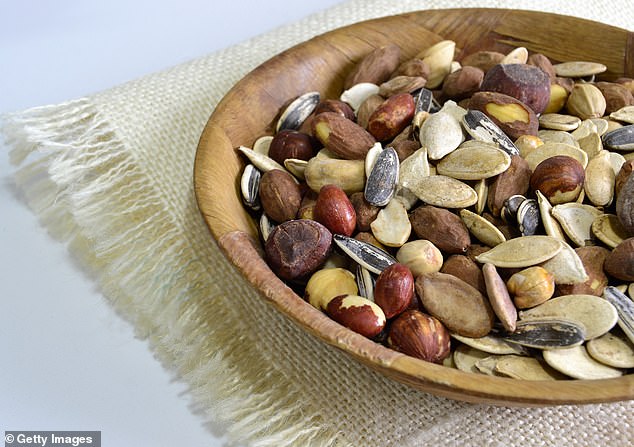Simple diet swaps could be key to preventing early-onset dementia, researchers have revealed.
About 7million Americans have been diagnosed with memory-robbing dementia, with that figure set to nearly double by 2050.
However, one major Lancet study published last year found more than a dozen of the most common risk factors for dementia are modifiable, including diet.
And the results are clear. A landmark trial unveiled earlier this year found people at risk of developing dementia improved their cognitive scores after implementing diet changes, as well as exercise.
Now, recent studies have shown foods rich in nutrients like protein, antioxidants and carbohydrates could reduce the risk the most.
Eggs, which were long demonized for high fat and cholesterol, in particular are enjoying a health renaissance for containing brain-healthy amino acids.
Berries and dark, leafy greens, meanwhile are rich in antioxidants that protect brain cells responsible for memory shielded from inflammation.
And even dark chocolate may improve blood flow to the brain and boost functioning in old age.
Daily Mail has revealed the best dementia-fighting foods below.
Studies have revealed the foods that are most likely to stave off dementia (stock image)
Eggs
Eggs are a key feature in the standard American diet, with more than one in three adults claiming they have them for breakfast on a given day.
One large egg contains about 150 milligrams of choline, about one-quarter of the recommended daily value. Choline is an essential nutrient also found in protein sources such as salmon and beef and chicken livers that supports memory, mood and muscle control.
It’s thought to boost levels of the neurotransmitter acetylcholine, which controls memory and learning, and reduce levels of neurotoxins like homocysteine that damage neurons.

Eggs are rich in brain-healthy nutrients like choline, which supports memory and learning
A study in The Journal of Nutrition found that older adults who consumed more than one egg per week had a 47 percent reduced risk of dementia compared to those who had less than one egg in a week.
The researchers, from the Rush University Memory and Aging Project in Chicago, noted this was likely due to the choline in the eggs.
Another study published last month in the journal Nutrients looked at more than 400 adults in China over age 50, half of whom were diagnosed with dementia.
The researchers found that participants who ate eggs every day had a lower risk of dementia than those eating them only weekly or monthly.
One large egg also contains six grams of protein, which provides amino acids needed to produce neurotransmitters like serotonin. Serotonin is crucial for cognitive function and reducing levels of toxic amyloid-beta plaques, a hallmark of Alzheimer’s disease.
Berries

Berries are rich in antioxidants, which reduce inflammation in the brain and prevent brain volume from shrinking (stock image)
Strawberries, blueberries and raspberries, among others, are well known for containing antioxidants, substances that protect cells from damage caused by toxic molecules called free radicals.
Left unchecked, free radicals induce oxidative stress, leading to inflammation and the production of amyloid-beta.
Found in the brain’s gray matter, amyloid-beta builds up and forms plaques, which attack brain cells and cause overall brain volume to shrink.
One 2023 study out of the University of Cincinnati found that adults between 50 and 65 who ate a cup of strawberries every day for 12 weeks performed better on memory tests and had fewer symptoms of depression than those who took a placebo.
Those researchers also published a recent study in the journal Nutrients that found regular consumption of blueberries reduced signs of cognitive decline.
Berries are a staple of the MIND diet, a combination of the Mediterranean and DASH (Dietary Approaches to Stopping Hypertension) diets that prioritizes anti-inflammatory foods.
Dark chocolate

Dark chocolate contains compounds called flavonoids, which increase blood flow to the brain and prevent damage (stock image)
Chocolate is generally seen as a ‘guilty pleasure’ and something most people should limit.
But in moderation, dark chocolate has been shown to lower the risk of dementia.
Dark chocolate is rich in flavonoids, compounds found in plant-based foods that have antioxidant and anti-inflammatory properties, much like berries.
Flavonoids also increase blood flow to the brain, preventing damage and improving overall function.
A bar of dark chocolate can contain anywhere from 200 milligrams to 1,000 milligrams depending on the size, manufacturer and cacao percentage.
A recent study published in Nature Food of 125,000 people found those who consumed the widest variety of flavonoids, including dark chocolate, had a 14 percent lower risk of all-cause mortality.
Another study found that among adults ages 50 to 69, those who took a cocoa supplement with high flavanol content for three months performed better on memory tests than those who took supplements with lower flavanol levels.
Whole grains and nuts

Unsalted nuts have been shown to lower dementia risk in older adults (stock image)
Like eggs, carbs have long been considered a nutritional boogeyman due to the risks of weight gain, high blood sugar and diabetes.
High glucose (blood sugar) levels can damage brain cells and blood vessels in the brain, potentially leading to dementia.
But whole grains like wheat, brown rice and oats contain complex carbohydrates, which digest slowly and provide the body with a steady, regulated flow of glucose.
Whole grains also are high in fiber, which ferments in the gut to form short-chain fatty acids that regulate inflammation in the brain.
A 2023 study in the journal Neurology found participants who consumed whole grains regularly had a slower rate of memory decline with age than those who did not eat these foods.
Nuts, meanwhile, are rich in omega-3 fatty acids, which may increase the volume of the brain’s memory center, the hippocampus.
Research published earlier this year found eating a handful of unsalted nuts a day was enough to lower the overall risk of developing dementia.
Like berries, whole grains and nuts are both staples of the MIND diet.
First Appeared on
Source link




